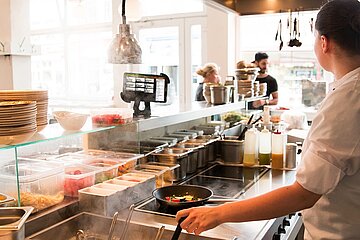Millions of tons of food end up in the trash every year - and most of it unnecessarily. The term "waste management" covers a wide range of options for putting a stop to food waste: According to calculations, efficient processes enable savings of up to 8 percent of the goods used.
From apps to artificial intelligence - multiple paths lead to the ultimate solution
Nowadays, various apps have dedicated themselves to the topic of food rescue. With their help, "food savers" can purchase leftover food at a low price - a win-win situation for companies, consumers as well as the environment. To prevent surpluses from occurring in the first place, new offerings are making their way into hotels, restaurants, and bakeries. The possibilities range from cloud-based inventory management systems to digital waste management tools that can identify optimization potential in daily operations thanks to artificial intelligence.
"Cook-and-chill" processes as an approach for more efficiency in the kitchen
Tim Plasse, managing director of the Benediktiner Weissbraeuhaus' in Giessen, Germany, knows that technologies are able to make an important contribution to efficient waste management. "In a conventionally equipped kitchen, the situation in terms of stress levels is always on the verge of collapse," says Plasse. With the cook-and-chill process, products can be made more durable and prepared with pinpoint accuracy. "We no longer want to prepare in the evening, but only produce exactly what is ordered," says the managing director.
Guests need to be sensitive towards that issue
A factor that should not be underestimated: Guests and customers should also be sensitized to the conscious use of food - for example, in terms of portion size. "More flavor means more enjoyment. Less taste has to be compensated by quantity," says Plasse. His approach provides his guests in Giessen with a balanced portion size on their plates, in line with a resource-saving but flavourful cuisine. "That helps us keep portion sizes more manageable to begin with. After all, once dishes that are too generous end up on the guest's plate, they are inevitably discarded if leftovers remain." And by the way, if anyone is still hungry in Giessen is invited to ask for more.

